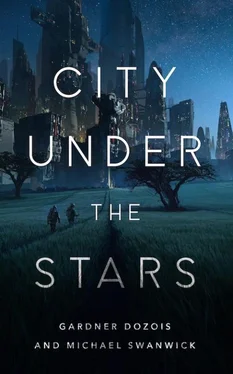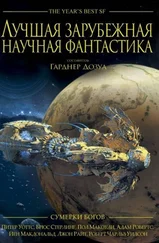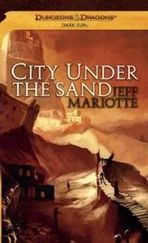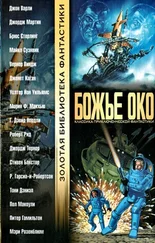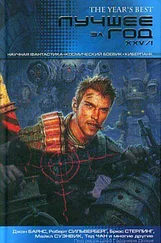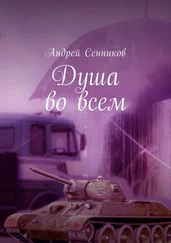Here the Hudson ran swift and fierce, as if impatient for its translation into the realms of the Divine, at Ossining. It was a wet, chilly morning. A breeze skimmed silver mists from the broad, gunmetal surface of the river; they boiled up around the black iron of the bridge, and swirled off into the lightening upper air. The sun was just climbing over a forest ridge to the east, sending broad fans of smoky light slantwise through the mist, striking bright highlights from the oily, turbulent water. The span boomed hollow under the transport, buzzed, boomed, buzzed. They were in the middle of the bridge, with everything gray and raw blue and silver-orange, the sky opening into hot gold east, night dying away to the west, the river rolling a humped shoulder below. Hanson felt something move inside, something slip, like a landslide in his head; he was leaving everything he’d ever known, everyone he’d ever known, behind. Then up the steep, thick-wooded slope of the opposite bank, and time for one last look back at the Hudson as it wound toward Ossining, back over all the lands stretching away toward Orange, where he had kept his life. Beaded with cold dew and slapped by raw morning wind, Hanson wondered if he felt regret or relief. And could not decide. And the river sank away behind, and was gone.
* * *
Early that evening, the transport rolled to a stop in a nondescript clearing in the woods. There was a pile of rubble in one corner that maybe used to be a house, and, among the weeds, a blistered tangle of Utopian machinery, made of an alloy so complexly specific to its task that it had no value even to the scavengers that ranged out from the cities and smallest towns of York like starveling dogs in search of something, anything, that would keep their worthless lives going yet another day. It had memory, down to the molecular level; you could melt it down and pour it into ingots, but, cooling, it would re-form itself into its original shape.
Much like a man’s life, Hanson thought—you could melt it down in the fire, change it completely, but old habits and old ways of thought would re-form it again in the same pattern somewhere else. Once a loser, always a loser. Once a fool, always a fool.
Hanson took advantage of the stop to hop down off the deckplates and make his way into the musky-smelling stand of staghorn sumac by the rubble-midden and take a leak. His piss steamed in the cold evening air, and tiny clodhoppers rose to the surface of the ground to soak in it, preening, pirouetting with evident pleasure and spreading their miniature fans wide. Willis had disappeared around the back of the transport, and Brigault stayed with the cab, face set into bored immobility.
Willis’s irascible voice sounded. “Hanson! Git on back here!”
“A’right. Coming!” Hanson shook free the last drop of pee, buttoned his trousers, and trudged around to the back of the transport.
Willis raised the rifle and pointed it right at his gut.
A kind of sizzle passed through Hanson, a cold and stinging surge of fear. As quietly as he could, he said, “What’s this about?”
“You know what it’s about.” Willis held the rifle steady, no posturing, and no way he could miss at this distance, a man to whom the gun held no glamour but was just another tool to be used with a minimum of waste-motion and fuss.
“Listen,” Hanson said, and then lapsed into silence. What could he possibly say? That numb despair and resignation were seeping back in, soaking into his bones the way his piss had soaked into the black dirt and the preening hoppers, making it impossible for him to speak. He knew that he should plead for his life, but he couldn’t summon the energy to do it. He should have known that he could never get away, never get free of the morass of Orange and the mess he’d made of his life. He should have known that everything would catch up to him, that the world would reach out and crush him as casually as he would crush a bug. He had known that, in fact, known it with a fatalism that was deeply ingrained in the marrow of his bones. He’d fooled himself into forgetting it for a moment, into letting himself feel a moment of relief and hope, and now the retribution when it came, when Willis squeezed the trigger of the rifle and the bullet ripped his body apart, would be even more bitter and black by comparison. His luck had never been good; he’d allowed himself to think for a while that it was turning, but now, as he should have known it would, it had run out entirely instead. He cursed himself for the hundred opportunities he’d let go by to slip over the side of the transport and disappear into the wilderness between towns, where he might have carved out a living of some sort for himself. He had a gun, there were brigands he could join… But now it was too late. Maybe it always had been too late.
After all, what did it really matter? If Willis didn’t kill him now, sooner or later the Crab in his belly would .
They stared at each other over the sights of Willis’s rifle. A wind came up and swirled dust around Hanson’s feet.
For what seemed like a very long time, neither man spoke.
At last Willis nodded to the side. Hanson’s knapsack sat there, in the shadow of the transport, old and frayed, pathetically small. “You’re family,” Willis said, “of sorts. Blood’s thicker’n water, they say. Can’t bring myself to kill you. But I won’t let myself be used neither.”
Hanson nodded, said nothing. The moment of crisis wasn’t over; he knew that there was still time for Willis to change his mind.
“A man like you,” Willis said. “A man like you—” Instead of finishing the thought, he noisily cleared his throat and spat a great gob of phlegm to the side. Then, raising his voice, he shouted, “Brigault! Get off yer thumb and let’s get out of here!”
As Willis strode off Hanson noticed for the first time that he had a slight limp, a stiffness in one leg that caused him to pull up slightly at the top of each stride. Willis was getting old, too. They were all getting old. To match the world, which was itself old, old and worn-out and weary, grown gray with the dust of millions of generations of lives and stained black with the residue of innumerable sins.
HANSON STOOD THERE for a long time, staring at the train pulling away until it had dwindled to a distant string of moving red jewels, and then, after it had vanished completely, at the empty road itself, a gray streak through blackness.
The night gathered around him. Crows exploded up out of the trees on the crest of a distant hill, startled by some noise in the forest, wheeling against the darkening sky and crying out harshly as they flew, in some guttural language he could not understand, finally settling back down into the treetops again. Then there was only silence, broken occasionally by the soughing of the wind through the trees, and by the distant and plaintive chime-like sobbing of some unknown creature far away among the trees in the dark.
At last, when he could stand the quiet and the black eventlessness no longer, he stooped to pick up his knapsack. The gun was still there, wrapped in his second pair of trousers. He stuck it in his belt.
There was a trail, hardly more than a deer run, that ran through the clearing here at right angles to the road, and briefly he vacillated between the two directions it proffered him. Then, because it hardly mattered, he chose one at random, and started walking.
* * *
The sun had gone out of the sky entirely now, the last orange cloud of sunset guttering from red to purple-gray to sullen black, and only the soft light from the Wall suffused the wood, flushing it with an unearthly coral glow that cast strange iridescent shadows with blood red edges. Hanson had been traveling for hours, following the trail through the rubble of Utopian ruins, imperishable foundations filled with waters rust-red and turquoise-blue from chemical poisons leached out of the surrounding soil, and the occasional rotting and incomprehensible machine, the remnants of a centuries-long Retreat from the bright dwellings of the Utopians. He pushed his way through woods spotted with feral ornamentals and fruit trees that over the ages had drifted away from their original functions and now produced fruit indigestible to human stomachs… or that perhaps had been designed in the first place to feed unknown and long-vanished races, strange and inhuman races that had been so thoroughly forgotten that neither their names nor even the memory of their presence had survived, save only for the trees. In all this time, he had seen nobody and arrived nowhere, but only walked, unthinking, like an automaton.
Читать дальше
